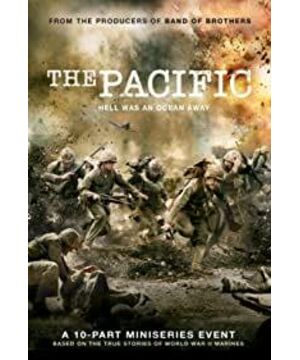Watching the NHK documentary on the Pacific War, I wanted to ask the same question. The memories of the Japanese veterans inside are horrifying: "Those who can speak will live for three days. Those who don't speak will be finished tomorrow." The dying cannon fodder waited to die in the silent and deep jungle, surrounded by piles of carrion and maggots. Regarding the description of maggots, American films are not exaggerated.
But these idiots don't know how to surrender. The Soviets of 40 years, the British of 41 years, the Germans of 45 years, not to mention the lovely Italians of 43 years, all run faster than rabbits. Deserting is the most beneficial behavior for physical and mental health in absurd wars, but these idiots in Japan not only did not surrender, but also tied bombs to themselves and others, forcing the common people to go to "Jade Break" together. After watching episode 9, I remembered that in NHK's documentary, the number of casualties on Okinawa was far more among civilians than soldiers, and a large number of civilians went to the beach to throw themselves on cliffs to express their "loyalty to the emperor"... how many ghosts are there? The common people really want to be "loyal".
Silly Bs, if you don't be angry youth, don't you even have the courage to be a deserter? What's the best-selling book "XX people can say no". Che, come out and read the book "XX people say no to their bosses"? (Please feel free to substitute the word XX)
I guess, these stupid Bs are really masochists in their bones. Coincidentally, the "angry youths" in the War Department were also full of sadists. This is completely a matter of being willing to fight and be willing to suffer. The idiots can admire Da Zhengxin, probably not because of how far-sighted he is in strategy and tactics, but because he especially set an example, pouring out the water in his kettle, and then marching with the hungry and thirsty soldiers. Silly Bs are especially easily moved by such approachable deeds. The pole in the museum is proof of that. If there are Silly B fans, Silly B idols will naturally appear. The former is a cause, not an effect.
You can't blame Eugene for having a blast at the end trying to kill every Japanese. In episode 1, Americans went from being afraid of the Japanese to discovering that the Japanese are human too. In the ninth episode, the Americans finally discovered that this group of stupid Bs can't be counted as human beings. This is a group of squirming, obedient maggots who are unsure of right and wrong, and who feel that they are especially wronged, and are deeply moved by their own persistence at every turn.
In the 1990s, as a result of the post-war Americans' new colonial construction in Japan, the Japanese seem to have finally come to their senses. In the NHK documentary, the host asked himself: Why were we so stupid and obedient back then?
I may be wrong. The Americans in this film don't seem to be the protagonists. Because people who are physically and mentally healthy really don't look good. The peoples of the East seem to be inherently cheap. Whether it is Japanese, Chinese or Burmese, etc., it seems that they don't care about human life, their knees and the like are too important.
The film has given Americans new insights into that war. There is an American comment that is quite reliable: Dear, I'm sorry, this film is not entertaining enough.
Similarly, the A Thin Red Line movie has been thrown to Java because who said that the obscure literary film is not as good as Saving Private Ryan Entertainment?
View more about The Pacific reviews











